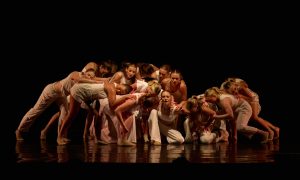Just For Kix Founder and Executive Director Cindy Clough has a vast network of more than 200 youth dance programs across numerous states under her watchful eye. Since 1981, she’s been teaching or coaching dance, and even before that she was instructing baton twirling! It seems she truly can do anything she puts her hand to.
With time and experience on her side, she knows how to run a dance program and a dance studio not just well, but with excellence. She shared the following tips on how to run a thriving dance program and/or studio.
#1. Get people to buy into you.
“I feel like your personality and the way you treat people are the two most important features,” Clough says. Clients have to enjoy you – they should want to be with you, believe that you make it fun and find you inspiring. Also, would you be someone who people want their child to be around? Are you a role model? If not, you will not see a lot of growth.
#2.Always under-promise but over-deliver.
Seek to always over-deliver to clients (dance students and parents), which equates to providing exceptional customer service. For tips on this, Clough recommends the book Hug Your Customers: The Proven Way to Personalize Sales and Achieve Astounding Results by Jack Mitchell.
#3. Remember that what goes around comes around.
That pesky kid hanging out in your lobby while his sibling finishes jazz class could eventually become a dad who will be shopping for dance studios in your area for his daughter. So always treat people of all ages with kindness and sincerity. “I’m to the point where I’ve taught the next generation of kids,” Clough explains. “I’ve had the child go all the way through my program, and now I have their child! So you really have to think long-term that the way you treat people really comes back to you.”
#4. Pick successful people’s brains.
Find directors and studio owners whom you admire, and then absorb whatever advice and wisdom they have to offer. Going at it alone is not just prideful but unnecessary. Clough comments, “It’s interesting, at dance conventions, I find people mostly want to talk about themselves instead of listening, and it’s really smart to be a sponge and to absorb as much as you can from other people because that’s how you’re going to grow and learn.”
Yes, networking is important, but that doesn’t mean you do all the talking. Clough adds, “Learn as much as you possibly can, and it will better help you handle your business and whatever comes your way.”
#5. Join a community of people in the same boat as you so that you can ask questions.

Cindy Clough with her husband Steve. Photo courtesy of Clough.
Clough started a closed Facebook group (you can request to join) called Dance Coaches & Teachers Unite. Now more than 6,200 members can post their questions when they need guidance. Recent questions include “What program do you use to edit videos?”, “Is there an easier way to do signups for summer classes?” and “What kind of things does everyone make sure to include in their ballet intensives/ballet classes?”
Other conversation topics include songs (“Looking for candy-themed songs for a ballet dance”), costumes (“Looking to purchase MSHSL compliant jazz uniforms”), travel (“What ways do you ship/transport props to nationals far away?”), dance attire vendors (“Want to order new logo wear for the coming season, would love some recommendations for affordable vendors”), recital themes (“I am stuck and can’t figure one out yet. We have done under the sea, candyland, circus, movies”) and competitions (“We are attending Starpower Nationals for the first time. Any advice?”) Join a group or organization that can help you when you are stuck or need some fresh ideas.
#6. “Spend time developing you.”
Studio owners, directors and coaches can forget that they need to take care of themselves when their schedule is hectic. And self-care is vital. But past alone time and rest, they often overlook their own personal development. When was the last time you read a book with industry advice, attended a seminar, signed up for a conference or got a mentor? These are important, too. As Clough describes, “You are the product people see. You’re the one who’ll determines if your year or your studio is a box office hit or a box office flop.” So invest in yourself!
#7. As a studio owner, make sure your lobby/front desk administrator is friendly, professional and engaging.
“The first person the people see is important because that’s the person who’s going to be the face of what you do,” Clough says. “They need to be a salesperson and outgoing because if a dancer comes in to take hip hop, you’re hoping they are told about tap, ballet and all the other options. You don’t want them to just do one thing. You want that student doing as much as possible.”
#8. Think about what the image of your studio/space is telling new clients.
When was the last time you walked into your studio/space and really saw it with new eyes? Clough says, “Sometimes I think it’s important to walk into your lobby and to look at it like an outsider would. Often studio owners look past all that stuff, because we see it every day. Look at what’s on the wall, what’s on the counter. Is it clean? Would somebody new want to come in here? And what are you trying to sell? You go into some studios and it’s trophies, trophies, trophies everywhere. So obviously when a newcomer walks in, they get the idea that you’re all about competition.” Make sure your values and vision is reflected in your lobby and other spaces.
#9. Don’t be afraid to offer 8- or 12-week sessions.
Since some kids and teens don’t always like to sign-up for a whole year, it can be beneficial to add the option of 8- or 12-week sessions. These dancers can be added into your other classes. “Sometimes I’ll add kids into my classes throughout the year,” Clough says. “Yes, you have to watch the risk of making the consistent, long-term people in the classes angry. But I still do add in new students. Just in my rep classes, though, not my advanced classes. This is a great way to grow.”
#10. Focus advertisements on little kids.
Instead of putting your most advanced dancer on the poster, put little children. “Most people by the time they’re 10 already know where they’re going for their dance studio,” Clough points out. “Preschoolers are what you’re trying to attract. So a lot of your ads should be focused on that.”
#11. Treat your time like it’s money, because it is.
Don’t waste time on tasks and dramas that aren’t worth it. “You can get so caught up on things that don’t really matter that you’re wasting time and not getting done what you really need to do,” Clough says. “Time is valuable. So do what’s smart, and be intentional.”
By Chelsea Thomas of Dance Informa.















